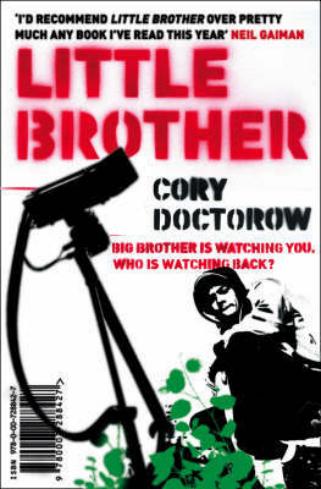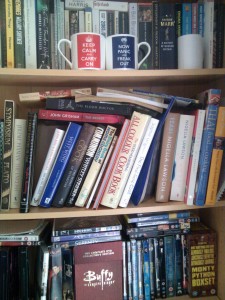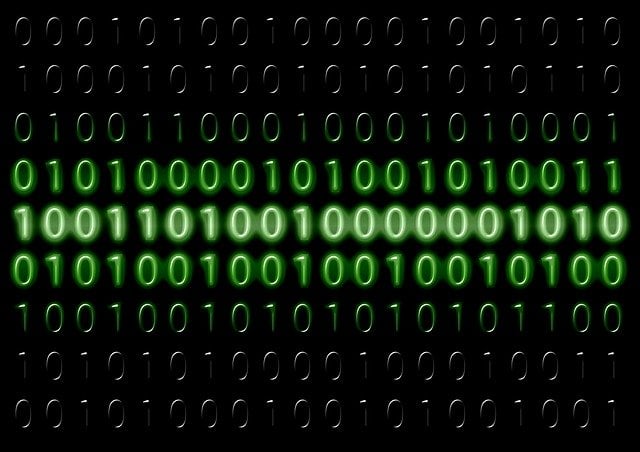A Stock Exchange For Digital Media
The Internet is "the world's most efficient copying machine" -- Cory Doctorow.
This is a long and rambling blog post which asks two questions:
- Given that we can only read one book at a time - can we set up a "Kindle Stock Exchange" for our unused media?
- If so, what effect would this have on content producers and sellers who rely on artificial scarcity?
This has been mulling over in my head for some time.
Transactional Friction
One of the great advantages of the digital era is the reduction of transactional friction.
The time, effort and money it takes to perform a transaction in the online world is radically reduced from that of the physical world. Sending a letter to the other side of the world used to take weeks - and involved ships, planes, and physical delivery. Now a click of the mouse sends it anywhere in an instant.
Neal Stephenson's novels in the Baroque Cycle document the rise of the bank note. It used to be common practice for wealthy people to lug their gold with them when they went on journeys. This was, as you can imagine, a highly inefficient practice - it was slow, dangerous, and expensive. The bank note reduced the friction of having to physically transport gold.
The efficiency of being able to settle large debts without the need to physically move goods was a revolution which introduced the free movement of capital, and dramatically altered the nature of debt and lending. It shaped the modern world.
The digital world can also free us from the needs of the physical. While many of us already have some goods that only exist as 1s and 0s on disk - some pioneers have already shifted as many of their possessions as possible away from the physical world. They've turned their heavy, impractical, and inefficient gold into a light, practical and frictionless bank note. A lifetime of books, films and music - stored on a lightweight thumb drive. Or floating weightless on the Internet.
That's why, last year, I decided to burn all my books.
Making Money
Here's a picture of my book shelf. At any moment, I can only read one book at a time, watch one DVD, and listen to one CD.
Would it make sense to sell all the books and DVDs I owned except for the one I was currently using? When it comes to physical books - no.
It would be so inefficient. It takes too much time, money, and effort to sell a single book than the value I would recoup from doing so. Sticking a book on eBay, postage, packing, dealing with refunds etc. is a lot of effort for relatively small gain.
The digital world changes all of that. While the ability to instantly consume is exciting, what intrigues me is the ability to take my goods to market - and the consequences that would have on capitalism.
What would happen when - rather than buying books instantly - I can offer them for sale instantly?
Selling My Bookshelf
Imagine if you could easily rent out your DVDs - like a mini-BlockBuster. They're sat unused on the shelf all night, ignored while you're at work during the day, left unplayed when you go shopping.
The hyper-efficient online world makes this possible.
Just like taking a loan secured on my assets (car, house), I can release equity from my digital goods by selling them when I'm not using them. Which is most of the time.
99% of the time, your DVD collection isn't in use. You may share them with your family, friends, and co-workers - why wouldn't you share them with everyone?
There are some very good reasons why not in the physical world - access, lack of selection in your collection, wear and tear - but in the frictionless online marketplace, most of these concerns disappear.
Just as on eBay, your single DVD sits on the same shelf as someone selling thousands of DVDs. The buyer probably doesn't care about range of selection or the providence of a seller - she just wants the item she desires.
With digital copies there are no issues of wear and tear and an online copy of a work is instantly accessible.
A second hand digital work is identical in quality to a factory fresh copy. My ebook edition of Little Brother is bit-for-bit identical to one bought anywhere. In a perfect market, it would fetch the same price as one purchased from a retailer. Or, more likely, the retailer would reduce the price to the lowest available on the market. 
(This leads us down an interesting path. The whole notion of "second hand" or "used" goods disappears when we're talking about digital copies. But that's for another post.)
Real Time Trading
We can even go a step further. Stock trading used to be conducted by sweaty men shouting in arenas. There are now electronic agents on the the stock exchange which process millions of trades per second. Every millisecond the computers execute trades based on real-time information.
I've said previously that you can only read one book at a time. Your eBook reader will only display one page at a time - so why not sell the pages that you aren't reading? In the physical world, perhaps two people can read a book at the same time (if they're close and not overly annoyed with the other's reading speed). In the digital world, you could have one reader for every page in the book.
The second you click "Next Page" your eBook reader could instantly find the cheapest price for the page you want to read - and sell the pages you're not reading for the best price.
A DVD could be separated into scenes or - to push it to the extreme - individual frames. If I sell my movies when I'm not watching them - why shouldn't I lend or sell them while I am watching them?
The Effect
Moving from transporting gold to transporting bank notes to digital trading has radically changed the nature of money and banking. The free movement of capital completely disrupted the way the world works. The free market dominates economic thought. But it is only a free market between giant players. Only corporations can afford to play capitalism's game.
Will the free market be brought down to individuals? Will a grandmother in her living room be able to sell her digital goods as easily and freely as Warner Brothers?
What does the media publishing landscape look like when every consumer can change their bookshelf into a second hand store? Why would anyone buy a copy of a work from Amazon when they could borrow from their neighbour - even if that neighbour lived on the other side of the world?
Would we see multiple Bourse to facilitate the exchange and a willingness for people to sweat their assets?
Perhaps it will move us to "subscription" models for mixed media - taking a £50 per month subscription to books in the same way many of us do for television channels.
What does it even mean to sell goods when they can be replicated instantly at zero cost?
I don't know - but I think it will be exciting to witness.
There Is An Analogue Hole In Your Mind
Applying analogue thinking to the digital world leads us down some interesting rabbit holes. As a thought-experiment, it's incredible to imagine that we could end up in a crazy world where we pay-per-word, where the right to read is predicated on software stock brokers trying to extract every micro-cent of value out of copyrighted works.
We need to break out of our old ways of thinking. The zero-friction economy is a paradigm shift (in the sense of Kuhn). We need to adapt our modes of thinking and our economies to this brave new world.



 Falsehoods Programmers Believe About Families
Falsehoods Programmers Believe About Families NFTs means the future value of art is zero
NFTs means the future value of art is zero
Well if you could attach Bitcoin technology to every bit of media then yes you have what you want in an already defined mechanism for exchanges. You need to be happier about DRM though as their feels like a DRMish thing around it.
Bank notes are carried around in lieu of physical, exclusive goods. Digital media isn't exclusive, only the licenses are. And there's an even more efficient way of avoiding the exclusivity of licenses, which is to steal them - aka people consider their digital licenses to be less than worthless; they're happy to give them away in exchange for a small probability of being taken to court. If you did allow an open secondary market in digital licenses, it would be in the interest of the license holder to beat every offer - which many do now, by offering their digital goods for free or nominal amounts or "pay as much as you want".
(Bank notes are no longer carried around in lieu of exclusive goods, but they themselves are exclusive, have reasonably sophisticated DRM attached, and people with very pointy sticks are paid to come after counterfeiters.)
Paul Graham says it better than I do: http://www.paulgraham.com/publishing.html
I think the conundrum of whether pure information can be owned, rather than the physical embodiment of it, goes back a lot further than the introduction of digital technologies. The concept of a licence to use information goes back at least as far as the first use of "letters patent" to assign the rights to exploit an invention (Wikipedia tells me that, in the UK, this was first done in 1449) and I imagine lawyers have been making a good living from intellectual property infringement claims ever since!
That's not to say that digital technologies don't hugely magnify weaknesses in the legal concepts and framework though and, as we all recognise, copyright law is severely tested in a context where copying is very cheap to do. I wonder if one could argue that it was the idea of selling physical copies of music and literature that was the aberration, substituting physical ownership of the media for the intellectual property licence which is what was intended all along?
Your post also reminded me of the legal wrangling around CableVision's cloud DVR service, which I believe was ruled legal largely because they deliberately duplicated the stored media (every subscriber had their own distinct physical copy of each show in the cloud, clearly a poor design decision as it significantly increases costs while not affecting the functionality in the slightest). I don't pretend to understand this legal position, but it does serve to illustrate the difficulty of transferring analogue legal interpretations into the digital world.